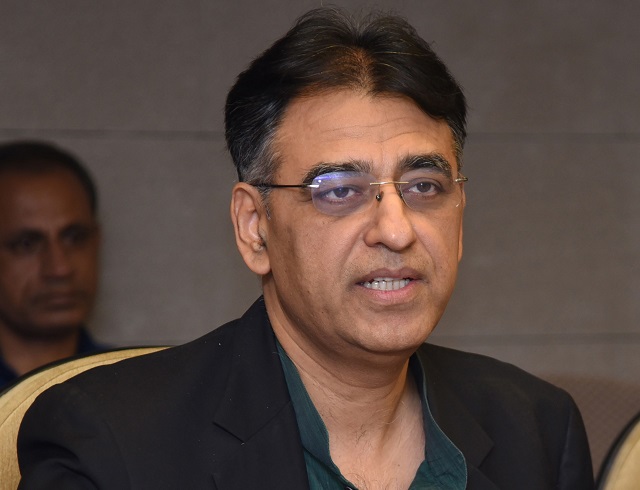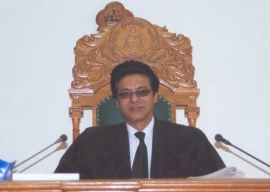
The Economic Coordination Committee (ECC) of the cabinet conditionally cleared the summary to raise the loans from six Islamic banks without first resolving the core issue as to who will return the principal amount and bear the cost of Rs200 billion debt servicing.
At the current rates, the annual debt servicing cost will be Rs20 billion.
The government has also decided to implement the tried and tested policy of the previous Pakistan Muslim League-Nawaz (PML-N) government for resolving the issue of the monstrous circular debt: that is to borrow from commercial banks and park the loans at the Power Holding Company.
The ECC also decided, in-principle, that there would be no gas outages for domestic and commercial consumers during the winter but the mechanism for cross-subsidising the expensive liquefied natural gas (LNG) has yet to be decided.
Finance Minister Asad Umar chaired the ECC meeting. It approved provision of sovereign guarantees to the National Power Parks Management Company Limited (NPPMCL) for arranging Rs38 billion from the commercial banks to meeting financing needs of two LNG-fired power plants in Punjab.
The outstanding unsettled circular debt currently stands at Rs670 billion, excluding Rs607 billion that the two previous governments of the PML-N and the Pakistan Peoples Party (PPP) had borrowed from the banks but parked in the holding company. The total size of the circular debt comes to Rs1.277 trillion.
The fresh loans of Rs200 billion will be obtained from the consortium of Islamic banks against the assets of power distribution and generation companies, according to the Power Division officials. The assets have been identified by the DISCOs and GENCOs.
In the first phase Rs100 billion will be raised by pledging 43 properties of with the banks. The officials said that the Bank Islami has indicated to provide Rs20 billion, Al Baraka Bank Limited Rs5 billion, Faysal Bank Limited Rs20 billion, Dubai Islamic Bank Rs8 billion, the MCB Islamic Bank Limited Rs10 billion and the Meezan Bank Limited Rs50 billion.
The banks will determine the exact financing size after scrutinising the financial statements of the power distribution and generation companies, said the officials. The loan will be extended for a period of 10 years and at six-month floating rate of Karachi Interbank Offered Rate plus 1%. The banks have demanded that the Ministry of Finance should allocate budget for making interest payments.
Finance Ministry officials said that there was lack of clarity on part of the Power Division on account of debt servicing, although it mentioned in the summary that the loan cannot be recovered from the consumers due to legal issues.
A committee, comprising Ministry of Finance, Power Division, National Electric Power Regulatory Authority and Securities and Exchange Commission of Pakistan will finalise the modalities next week.
The six Islamic banks would immediately provide Rs100 billion while another Rs100 billion could be obtained as green shoe option. However, the banks have linked their lending with the condition that the companies would provide no-objection certificate to sell their assets to the financiers and the federal government would provide guarantees for rental payments and declaring the facility SLR eligible, according to term sheet.
Shahzad Qasim, Adviser to Prime Minister on Energy is playing a role in arranging the loans, according to the sources. About 43 assets of the distribution companies have been forwarded for their market valuation. Ten properties of each Peshawar and Multan power distribution companies, six each of Gujranwala, Lahore and Islamabad power distribution companies and five of Faisalabad Distribution Company will be pledged for raising Rs100 billion loans.
The circular debt is building up due to high line losses, low recovery, non-realisation of subsidies and delay in tariff determination and the issuance of notification by the government.
The Ministry of Finance will provide government guarantees for repayment of loan as well as interest.
According to the conditions placed by the banks, all the board of directors of the distribution and generation companies will have to agree to hold the properties in trust for the banks.
NPPMCL guarantees
The ECC also approved Rs38 billion guarantees to the NPPMCL to arrange funds for covering the remaining cost of two LNG-fired power plants.
The PML-N government had approved the setting-up of the Haveli Bahadur Shah and Baloki power plants, with combined generation capacity of 2,400 megawatts, at a cost of Rs190.44 billion. The federal government had provided Rs114 billion cash development loan to the NPPMCL.
The ECC had to issue the sovereign guarantees due to an ill-conceived move by Ishaq Dar-led Finance Ministry. On June 29, 2017, the ministry had changed the funding source of the both the power plants from the PSDP to Pakistan Development Fund Limited (PDFL) in order to understate budget deficit in that year. However, the PDFL declined to provide the required funds.
The NPPMLC has requested the government to arrange Rs70 billion to pay off the remaining cost of the Haveli Bahadur Shah and Baloki power plants. Against this amount, Rs32.8 billion short-term loan of the PDFL will be converted into equity.
The remaining amount of Rs38 billion will be raised from the commercial banks against the sovereign guarantees given by the Finance Ministry.
The SNGPL has already encashed the Stand-By Letter of Credit provided by the NPPMLC as security against gas supply. Due to delay in commissioning of both the projects, the gas could not be obtained but the SNGPL encashed the guarantees under “take or pay” deal.
Gas load management
The ECC decided, in principle, that there would be no gas load-shedding in the country during December-February period. It allowed injection of around 160 mmcf per day re-gasified LNG in the SNGPL systems for consumption by domestic and commercial consumers. The difference between indigenous gas and the expensive imported LNG is expected to be borne by consumers of other sectors.
The SNGPL estimates that one million British thermal units (mmbtu) of re-gasified LNG will cost Rs35.63 more than the cost of indigenous gas.
The available indigenous gas is merely meet 60% of the needs. Against the demand for over 6 billion cubic feet of gas per day (bcfd), the available indigenous gas stands at only 2.22 bcfd, the Petroleum Division informed the ECC.


1725443747-0/Untitled-design-(5)1725443747-0-165x106.webp)














COMMENTS (1)
Comments are moderated and generally will be posted if they are on-topic and not abusive.
For more information, please see our Comments FAQ